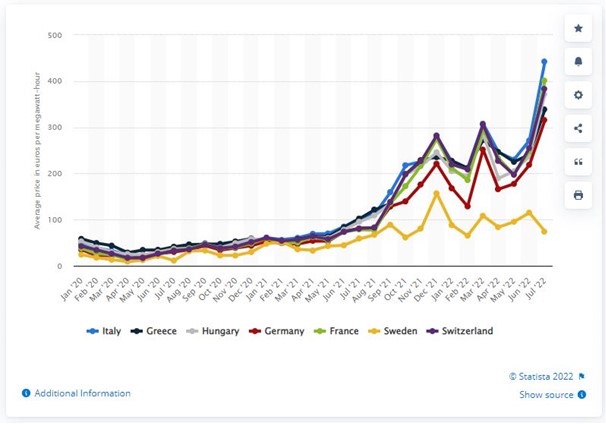En la práctica, la transformación ecológica y la electrificación no se están produciendo con la suficiente rapidez. Sin embargo, esto puede representar una oportunidad potencialmente interesante para los inversores en el sector de las energías renovables y no renovables, que serán necesarios para superar la mencionada crisis y sus "escollos" asociados.
Dependencia de los combustibles fósiles
Aunque el tema de la transición a la energía verde ya se abordaba antes del inicio de la pandemia, incluyendo la electrificación de diversas partes de la economía para reducir las emisiones de carbono que forman parte del modo de vida actual, el Statistical Review of World Energy for 2022 de la compañía británica BP muestra que el uso global de combustibles fósiles se sitúa actualmente en el 82%, mientras que hace cinco años era del 85%. En la práctica, esto significa que la economía sigue dependiendo de los combustibles fósiles y, aunque su cuota irá disminuyendo gradualmente, probablemente pasará mucho tiempo antes de que las energías renovables puedan tomar el relevo. La "energía verde" no crece tan rápido como debería. En este contexto, puede ser interesante diversificar la cartera en acciones de empresas mineras de carbón, que siguen manteniendo el liderazgo como combustible para la producción de electricidad.
El precio de la electricidad se dispara
¿Sabía que el precio de la electricidad en Europa alcanzó a mediados de agosto nueve veces su nivel de 2007? Y sigue subiendo. A ello ha contribuido el fin de la dependencia del suministro energético de Rusia, lo que limita mucho las posibilidades del volumen de energía disponible de otras fuentes, por no hablar de la necesidad de construir las infraestructuras correspondientes.
Crecimiento en toda Europa
Mirando el gráfico de Statista.com, que muestra la evolución de los precios en países europeos seleccionados desde 2020, podemos ver que en Italia, por ejemplo, el precio de la electricidad era de 38 euros por megavatio hora en julio de 2020, mientras que en julio de 2022 ya era de 441,74 euros por megavatio hora, lo que representa un aumento del 1062% en 2 años. También puede observarse un aumento similar en otros países seleccionados, como Grecia, Hungría, Alemania o Francia. Así pues, la inclusión de acciones de diversas empresas energéticas relacionadas con la electricidad puede tener un gran potencial en la composición de una cartera de inversión.

Gráfico: Evolución de los precios medios mensuales al por mayor de la electricidad en países seleccionados de la Unión Europea de enero de 2020 a julio de 2022 (Fuente: Statista.com)
El gas y el petróleo son interesantes
Ser ecológico y abandonar los combustibles fósiles sin detener el crecimiento de la riqueza de los países es probablemente el mayor reto al que se ha enfrentado nunca la economía mundial, porque el crecimiento de la riqueza es el crecimiento del PIB de un país, y éste ha estado estrechamente vinculado a las emisiones de CO2 durante décadas. Por otro lado, trae consigo la oportunidad potencial de invertir en el sector energético, no sólo en términos de electricidad o carbón, sino también en el sector del petróleo y el gas y las industrias relacionadas, donde también podemos ver altos aumentos de precios. Pero hablaremos más de ello en futuros posts.
Olivia Lacenova, analista de Wonderinterest Trading Ltd.